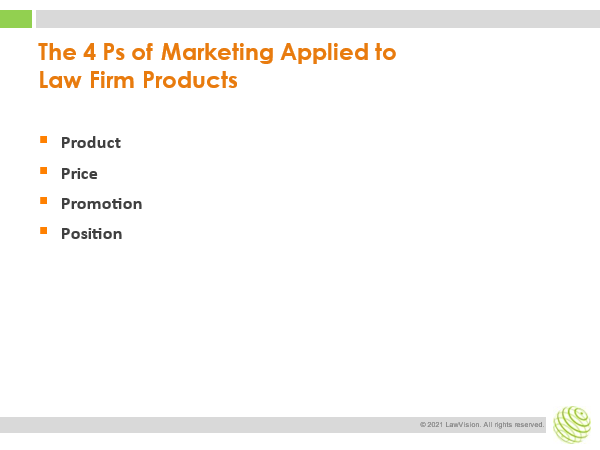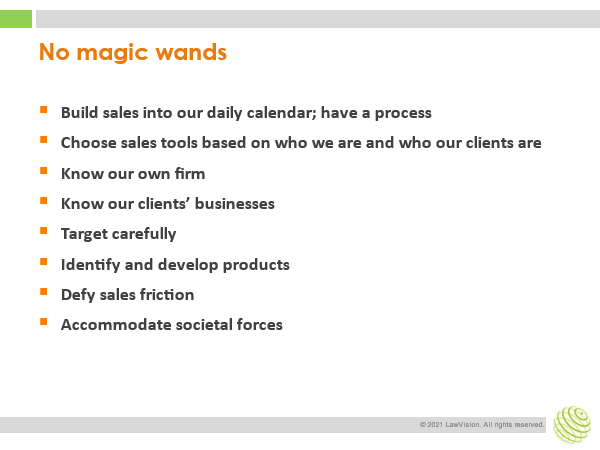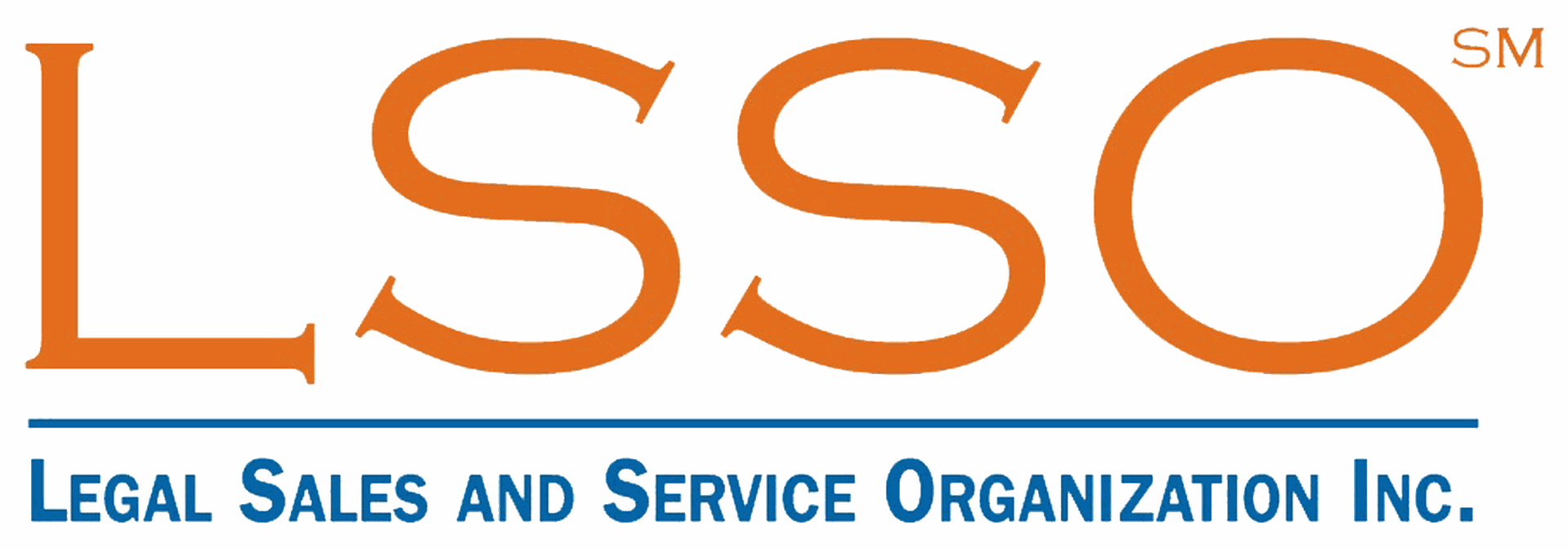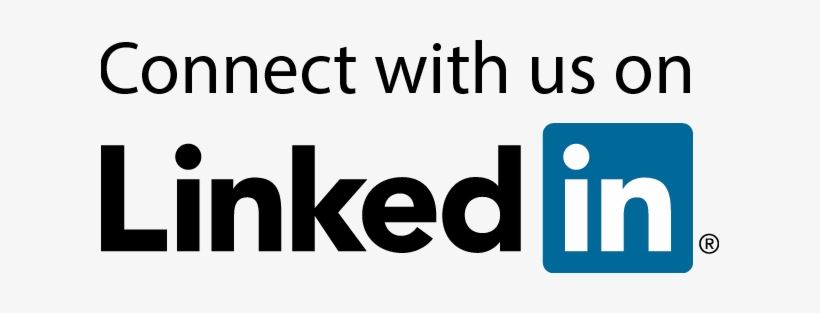By Steve Bell, Senior Consultant, LawVision
In this final segment of our article, Sales Trends in this COVID Moment, we explore some important contemporary law firm sales topics that do not fall neatly into earlier installments of his article – cataloguing techniques that sales professionals have deployed in the pandemic, suggesting the need for law firms to develop and implement sales process, and providing commentary on each of the steps in a sample law-firm sales process. We start with a long-overdue possibility: the development of law-firm products.
Products
In the 1990s, one of the top global accounting firms was asked by a client with operations on several continents to see what could be done to reduce its global tax burden. Some of the firm’s top tax-planning partners devised a complex new structure that involved multiple transactions over several years and sequential private letter rulings from tax authorities such as the Internal Revenue Service. When complete, the effort annually produced scores of millions of dollars of reduction to the global tax liability. The technique became known in accounting and legal circles as “the sandwich” or “the black box,” and it represents one of the first professional services products of the contemporary era.
The engagement required an enormous investment of time on the part of the tax accountants who devised and implemented the plan. Had the firm stopped there, the effort’s profit would have been acceptable. However, because of enlightened management, the firm set out to identify other clients with similar fact patterns and, because the intellectual investment already had been made, appointments with potential clients were virtually automatic, and subsequent engagements were spectacularly profitable.
At another Top 10 accounting firm, the tax accountants observed that litigators in several states were achieving success in establishing that intangible assets (such as engineering drawings) were not taxable as business personal property and that they should be removed from the personal property tax rolls. Further, the litigators pushed for court decisions that engineering drawings meant more than just the paper and ink on which they were printed (or the software on which they were stored). Engineering drawings, the courts ruled, also included the cost of the engineering work itself – a very substantial part of the cost of large manufacturing and utility plants.
The Top 10 accounting firm firms soon created a cottage industry in reviewing personal property tax rolls for intangibles, removing them, and generating substantial savings for the clients. The firm’s sales force found that this “intangibles tax product” easily opened doors for the tax partners and, later, for litigators who would be called upon to defend the accounting firm’s findings. Another brilliant professional services product.
At Womble, the law firm that I served for nearly 20 years, the leader of the Capital Markets group told me that his team handled the documentation for every significant loan and debt offering of a global money-center bank and had created an anonymized data base that could be searched and sorted by industry, geography, terms and conditions, and interest rates.
When I called companies that research had showed were in need of new or renewed revolving credit lines, getting an appointment was automatic, because clients craved this proprietary market knowledge. Yet another successful professional services product.
The topic of law firm products was first discussed as early as the turn of the century, but they have been slow to adopt the practice. Still, this would seem to be fertile ground for law firms and clients. Legal Tech companies have products. Alternative Legal Service Providers have products. So do accounting and consulting firms. Why don’t law firms? The answer is not clear, but those who linger in a law firm’s canteen long enough, will, with certainty, hear about some lawyer’s brilliant solution, which, with a little thought and effort, could be packaged and pitched to other companies with similar facts and circumstances. For enlightened firms, this is potentially productive and highly profitable new territory. And it is an arena in which the firms’ marketing and sales assets can shine!
Those who have analyzed professional services products have come to a 4-P definition of the exercise.

The more that legal services can resemble tangible services, the easier it is to market and sell them as a product, which, like a consumer product has discernable characteristics. It involves proven IP and workplans that can be replicated with each engagement. It can be delivered in a predictable fashion with predictable outcomes. It has features and benefits. It can be priced in advance – something infinitely more definitive than “for services rendered” or for “billable hours expended.” It can be promoted; it’s to describe and talk about. Marketing and PR staffs easily convert it to advertising, news releases, feature stories, marketing collateral, and presentations. And sales teams can use it with remarkable efficiency to open doors. With respect to positioning, products are almost by definition differentiated -- better, faster, cheaper, more-effective, etc. And the best products of all have an attribute that we can observe in the sandwich, the intangibles tax product, and the credit line data base product: it is unique. Nobody else has it.
Frictionless Commerce
Today’s law firms face a fierce competitor that most in the law firm business may not consider a competitor: Amazon. No, it doesn’t offer legal services (at least yet), but it does offer nearly completely frictionless commerce. A buyer searches for a product, is automatically provided comparable products, selects one, and buys it with one click of a button. Then, the buyer is instantly provided a list of complementary products that others who purchased the item also have bought.
Few buyers of legal services would characterize acquiring services from law firms as anything remotely close frictionless. In fact, sometimes buyers must work hard to buy what they want. Law firms have far to go to harvest the abundant potential of Artificial Intelligence and Marketing Automation systems, Client Relationship Management Systems, social media, and other sales-process components that Amazon and other great sellers have mastered.
Even as law-firm marketers work on these processes, much improvement can be handled at the individual-lawyer level. How easy is it for a client or potential client to find and contact a lawyer? Are a lawyer’s phone numbers and e-mail address accurate? Is the lawyer’s web bio and social media content up to date? How is the inquiry-response time – minutes, or hours, or days?
Like it or not, every business including law firms is compared by buyers with Amazon. The closer that law firms can come to operating like Amazon, the better and more effective their sales processes will be and the more revenue they will produce.
Societal Awareness as a sales issue
Buyers of legal services, especially General Counsel, are highly sensitized as never before to societal issues. Once the sole mantra of buyers was “Value, Value, Value.” Now, it is “DEI, ESG, and Value Add” Today’s prominent law firms have not just arrived at the table when it comes to diversity and inclusion and social justice. They have assembled and undertaken remarkable pro bono programs aimed at societal improvements, and they work hard to improve their diversity and inclusion performance. The suggestion here, then, is not that firms should launch new promotional campaigns about their DEI and social justice programs, but rather that they carefully consider how they communicate their efforts in the context of their business development programs. It’s important not to come off as though they just discovered societal inequities. Also, it is important to recognize that not every buyer has the same perspective on these issues. So, even as firms continue to do the right things, it’s important that they also be incredibly attuned to the opinions and interests of the individual buyers whom they are seeking to attract and serve.
The horizon
We sometimes are asked to scan the horizon for what will unfold for sales in the years ahead. The answer is as unclear as is the answer to the question of when the pandemic will truly end. We hear about the Metaverse. Will lawyers send their avatars into a client’s office or a courtroom? Who knows? Seems kind of far-fetched, but then again, so did the concept of e-mail when in 1982 a retiring US Postmaster in Bloomfield, Indiana, first suggested it to me, a young cub reporter.
How about blockchain and what it will mean to law firm sales? Another mystery that will unfold over time.
Here’s another: the connected world. Visionaries are speculating that with so many people working at home now and likely to stay there at least a good part of the time in the future, the connected home – TVs, refrigerators, security systems, thermostats, garage door openers and all the rest – will have a role in business and in sales. Maybe. Undoubtedly for law firms, who routinely are a step or two behind the rest of the commercial world, that will be quite a ways into the future, and it all will be worked out by young geniuses just out of school and currently entering the law firm sales and marketing field.
So, here is a summary of what needs to be known about sales in “these challenging times.” It’s not about tools, it’s about implementation. There are no magic wands, so it probably is better to simply concentrate on developing process and the other items in the chart below.

Oh, by the way, have you ever heard of the doorknob close? Salespeople actually use it. The sales meeting seems to be over, and the sales professional gets up and heads for the door. Then, remarkably, she remembers another sales point to bring up. For those who remember, Peter Falk as Inspector Colombo was a master of the doorknob close. We relate this story because we have a doorknob close for you today. Despite all the concepts we have laid out in this article, it comes down to something that is immutable and timeless: The need for human caring about the people who provide and those who consume legal services.
This concept is best summed up by Rudy Gaines, once a sales director at Womble, a business professional, non-lawyer luminary in the International Trademark Association, a highly effective salesperson, and a superb human being. He’s one of the Brain Trust members described in Part 1 of this article. Here’s what Rudy has to say, and the doorknob close on which we close. Of sales in this moment, Rudy says: “More caring, less selling. As the pandemic unfolded, I was open about my own fears and anxiety regarding COVID, which I think allowed my clients to open up about theirs. It’s ironic that when you share weakness, relationships get stronger.”

